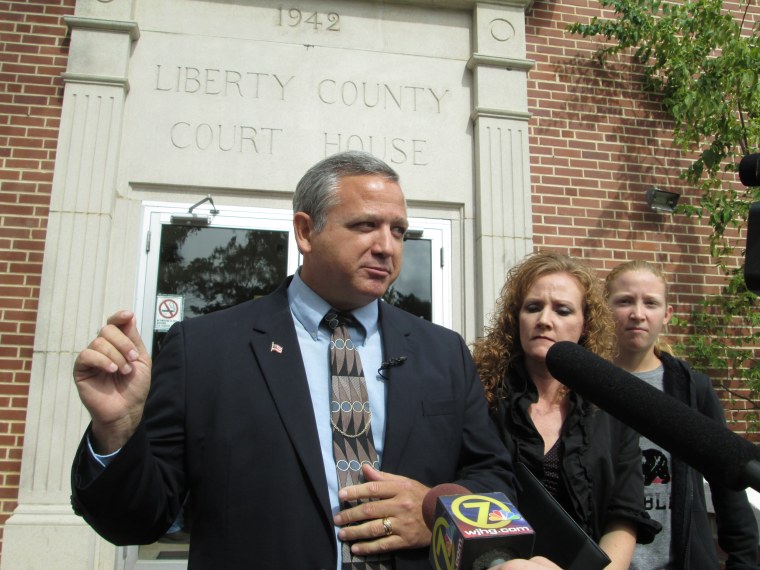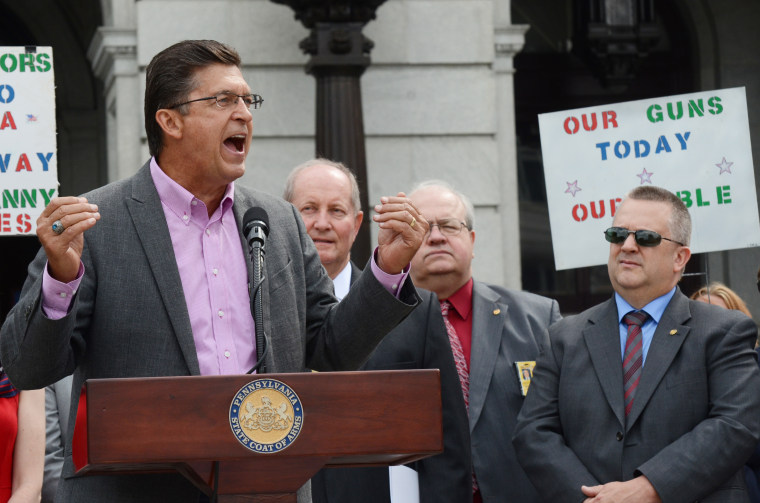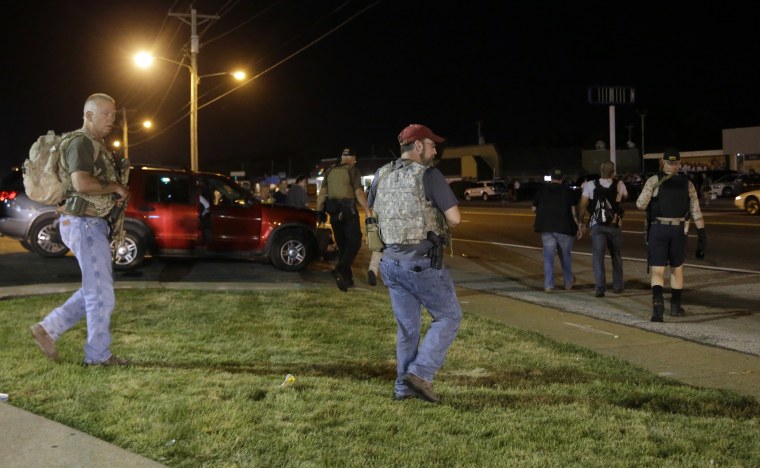The full version of this story was originally published by The Center for Public Integrity, a nonprofit, nonpartisan investigative news organization in Washington, D.C.
Sheriff Nick Finch let a pistol-packing man out of the Liberty County, Florida, jail, a decision that led state authorities to charge Finch with a crime — but also made him a hero to a radical and growing movement among sheriffs across the country.
It’s a movement that doesn’t just reject gun control — it encourages law enforcement officers to defy laws they decide are illegal. And it sometimes puts police on the same side as “sovereign citizens,” a fringe group that the FBI considers one of the most serious domestic terrorism threats.
On March 8, 2013, one of Sheriff Finch’s deputies pulled over a driver and found a loaded pistol in his pocket, according to the deputy’s sworn statement. Carrying a concealed firearm without a license is a felony in Florida, so the deputy arrested the driver.
Finch, however, ordered the driver released, and someone whited out his booking record. Finch later said he decided that “I know what law rules the day, and it’s the U.S. Constitution.”
Click here to read the full version of this story.
Gov. Rick Scott ordered Finch’s suspension. But then a former Arizona sheriff named Richard Mack called, and a group that Mack heads — the Constitutional Sheriffs and Peace Officers Association — became engaged.

Mack has referred to the federal government as “the greatest threat we face today,” and describes his association — which states on its website it is supported by the John Birch Society and Gun Owners of America, as well as annual dues payments of $50 — as “the army to set our nation free.” He said in an interview with CPI that he has grown the army by training more than 400 sheriffs in how to interpret the Constitution and how to resist authorities and laws that violate it.
Mack claims the dues-paying support of several hundred of the nation’s more than 3,000 sheriffs and the sympathies of hundreds more, but it’s hard to assess how many endorse his denunciation of the federal government as the corrupt and illegitimate enforcer of laws that trample on states’ rights.
On occasion, however, his group’s sheriffs have found themselves expressing views that resemble those of the sovereign citizens’ movement, which was also founded on claimed rights of legal defiance.
Dozens of sheriffs around the country — including John Hanlin, the sheriff of Douglas County, Ore., the site of last October’s mass shooting of eight students and a professor at Umpqua Community College — joined Mack in an aggressive letter-writing campaign to the White House after the 2012 Sandy Hook shooting, in which they vowed not to enforce any federal laws that tightened gun restrictions.

After the armed standoff at the Malheur Wildlife Refuge earlier this year, Mack traveled repeatedly to Oregon, appearing at high schools and fairgrounds, and giving interviews in which he criticized federal authorities. He’s also promised to help elect new sheriffs in the region who share his views. Gun laws are a focus of his ire, but federal lands restrictions and tax laws have also been in his sights.
After Sheriff Finch’s suspension, Mack organized a fundraiser in nearby Panama City and brought in Stewart Rhodes, head of the citizen militia group known as the Oath Keepers, the same group that made headlines last August for patrolling the streets of Ferguson, Missouri, with guns. (Mack is on the Oath Keepers board of directors.) Sympathizers created a Facebook support page for Finch, and online commentators expressed outrage at what they called an unconstitutional attempt by the state to interfere with his support for gun rights.
During Finch’s boisterous trial in October 2013, he was joined in the Liberty County courtroom by Mack, several other Florida sheriffs, and dozens of new supporters. The judge had to admonish the crowd not to laugh as the state presented its case against Finch, and in the end, the jury acquitted him of misconduct and falsification of records. He was reinstated as sheriff, and later granted back pay as well as attorney’s fees of more than $160,000. Finch, 53, remains the sheriff of Liberty County.
Winning over law enforcement officials
On a chilly morning last October, roughly 60 people — mostly older white men — sat at long plastic tables beneath the fluorescent lights of an auditorium in Hattiesburg, Mississippi, to attend a “Tribute to Constitutional Sheriffs and Peace Officers.”
At the meeting, four or five political groups — the local chapters of the Tea Party, Freedom Works, United Conservatives Fund — laid out their literature, candy, and swag on folding tables at the back of the room. The speakers included two local police officers, the president of Mississippi’s Gulf Coast Rangers citizen militia, a veteran who tracks gun laws in Mississippi, an investigator for the state’s attorney general, and finally, the star attraction: Sheriff Richard Mack. But only one Mississippi county sheriff showed up: Billy McGee, from the surrounding Forrest County.
Mack, who is over six feet tall and bears a passing resemblance to Ronald Reagan, stood before the crowd in a casual, desert-hued suit. Audience members queued to have him sign their copies of a booklet summarizing his case against the Brady Act, called “The Victory for State Sovereignty.” In America, he said as audience members nodded, “gun control is against the law. And we don’t get to violate the law just because we have a shooting in Oregon or Sandy Hook or anyplace else.”
“What we want now is for many of you to come to our certification training,” he said. “You come to a two-day seminar, get certified, and then you get back here to your state and you start providing this training, bam, bam, bam, go to every sheriff’s office, go to chiefs of police, go to county commissioners and show them this training.” Details about how to get the certification training, Mack assured the audience, would be forthcoming.
A local named Paul Boudreaux, 53, raised his hand from the third row. “What do you do about the sheriffs that are complicit with the federal government?” he asked.
'Tell the federal government, ‘You’re not going to abuse citizens anymore.’”
“Ignore them,” Mack replied. He reminded the audience that there are nearly 3,100 sheriffs in the country and that the association is aiming to get approximately one fourth of them to support its mission: “If we get that 600 or 700, there’s going to be no stopping. And then everybody in this country has at least two or three places in each state where they can go for refuge, find a true constitutional sheriff who’ll tell the federal government, ‘You’re not going to abuse citizens anymore.’”
Asked later what the worst abuses were that the federal government had committed in his community, Boudreaux brought up the gopher frog: an endangered species native to the Gulf region. To protect it, Boudreaux said, some of his neighbors have had hundreds of acres of land condemned as habitat where the frog can live. “Fortunately, because of our Second Amendment, we’ve still got the freest country on Earth,” Boudreaux added, crossing his arms.
“But the sheriff needs to know,” Boudreaux said, expressing a view that most legal scholars vigorously dispute, “that he can forbid federal agents from coming into his county and trying to enforce laws that are unconstitutional.”
Roots of the movement
Mack first made it to the national stage in 1996 as a sheriff from Arizona, when he and a sheriff from Montana challenged a provision of the Brady Handgun Violence Prevention Act before the U.S. Supreme Court. Using attorneys paid by the National Rifle Association, they argued it was unconstitutional for the federal government to require local chief law enforcement officers to run background checks on prospective gun buyers — and won, in a 5-4 ruling that struck down that provision of the act.
But Mack was defeated in the Democratic primary that year, and has since lost three more elections in two states for different offices. He nonetheless became a popular speaker, initially at John Birch Society and National Rifle Association banquets, and later at Tea Party events. In May 2011, he registered the Constitutional Sheriffs and Peace Officers Association with the state of Texas, but is just now filing for tax-exempt status with the Internal Revenue Service. As a result, the group’s financing is largely opaque.
According to Mack, more than 100 sheriffs have shown up at the annual conventions his group has organized, including many in 2014 when Finch received the group’s top honor: Constitutional Sheriff of the Year. Finch and 40 other sheriffs signed a resolution there declaring they would not tolerate any federal agent who attempted to register firearms, arrest someone, or seize property in their counties without their consent.
Mack says he envisions the sheriffs’ “take back” of the United States as a peaceful event. But he uses apocalyptic language to depict social conditions in America, describing sheriffs as a bulwark to forestall the violence for which armed, angry citizens around the country are preparing. Finch, too, said he sees sheriffs as a safeguard against all-out civil war. “If all the sheriffs would get on board and stand in the gap, then maybe we can avoid the violence that I believe probably is going to come at some point,” Finch said.
The constitutional sheriff movement, according to the teachings of Mack and his supporters, is rooted in the historical definition of sheriffs as the most powerful law-enforcement officers within their counties. The idea harkens to medieval England, when Anglo-Saxon kings tasked sheriffs with enforcing their edicts. English colonists brought the tradition to the Americas, and began electing their own sheriffs in the mid-1600s, entrusting them with overseeing the judicial process, carrying out legal decisions, and keeping the peace. Under the latter authority, they could organize citizen brigades to catch outlaws or defend against attackers, an arrangement known as “posse comitatus.”
In the 1970s, a minister in the white supremacist Christian Identity movement, William Potter Gale, wrote a series of articles that would come to be known as the handbook of the Posse Comitatus movement. Gale described sheriffs as the only “legal” law enforcement officers in the country and urged citizens to form their own militias to resist encroachments on their rights if sheriffs did not. The constitutional abuses he cited included the federal income tax system, gun control, federal education, and civil rights laws. He advised citizens to form their own “common law” courts to try officials who violated the constitution, and prescribed archaic punishments, such as hangings.
Contemporary “sovereign citizens,” who generally reject federal authorities, are inspired partly by Gale’s rhetoric and partly by past bloody clashes between federal officials and citizens charged with illegal gun sales and ownership. Terry Nichols, who is now in prison for planning the Oklahoma City federal center bombing that killed 168 people 21 years ago this week, is a member of the sovereign citizen movement, according to the FBI.
That April 19 bombing deliberately coincided with the date of three iconic events in the radical right’s historical pantheon — the "hot heard round the world" at the Battle of Lexington & Concord in 1775; a violent FBI battle in 1985 with members of an extremist Christian group in Arkansas known as the Covenant, the Sword and the Arm of the Lord; and the FBI’s climactic confrontation in 1993 with religious extremists belonging to the Branch Davidians in Waco, Texas, starting a fire that killed 76 people.
Nowadays, sovereign citizens number in the hundreds of thousands, and U.S. law enforcement agencies consider them the top terrorist threat in the country, according to a July 2014 survey by a University of Maryland-led terrorism study consortium. At least 14 police officers have been killed and another 14 injured in 62 incidents involving sovereign citizens since 9-11, according to J.J. MacNab, a frequent writer on anti-government extremism who consults for government agencies. Most of their attacks are “unplanned, reactive violence targeting law enforcement officers during active enforcement efforts,” the Department of Homeland Security said in a Feb. 5, 2015, report.
In one such incident, West Memphis police officer Brandon Paudert and another officer pulled over a sovereign citizen named Jerry Kane and his 16-year-old son in a van with out-of-state plates in May 2010. The duo had been traveling around the country peddling debt-avoidance seminars based on sovereign citizen beliefs. Kane had been threatening anti-government violence for years on his Internet radio show, and the traffic stop escalated rapidly into a tussle in which the younger Kane shot both cops dead with an AK-47. Police officers caught up with both Kanes hours later in a Walmart parking lot, where they were killed.

Mack and his supporters dismiss the idea that they are supportive of the violent measures taken by sovereign citizens. But some of his association’s members have found common cause with the group. In March 2011, for example, New Hampshire sheriff Christopher Conley — who was listed as a member of the council of the Constitutional Sheriffs and Peace Officers Association from November 2012 until 2015 – expressed support for claims made against the Internal Revenue Service by a sovereign citizen named Charles Gregory Melick. A deputy federal marshal had served a summons on Melick at Conley’s office, requiring him to appear in court about unpaid taxes, but Conley decided to write to a judge on Melick’s behalf, arguing that the service was not legally valid. “I have a duty to protect people’s Constitutional rights and protections,” Conley said in his note.
Conley was never directly punished for his choice not to detain Melick, but lost the 2012 election.
In 2014, at least three sheriffs showed up with constitutionalist citizen militia groups and members of the Oath Keepers to support Cliven Bundy’s standoff against the federal Bureau of Land Management at his ranch in southern Nevada. In a speech at the National Press Club in Washington, D.C. a few months after the Bundy Ranch standoff, Oath Keepers President Steward Rhodes gave those sheriffs a special shoutout. “You had Brad Rogers [of Indiana] there, he came on our behalf, you had Sheriff Peyman from Kentucky, you also had Jeff Christopher from Delaware,” he told the audience.
“So if we're a bunch of radical anti-government crazy cop killers, why were there police officers standing right there with us?” Rhodes asked. “It’s cause we're all in this together.”
Bob Paudert, Brandon’s father and the chief of the West Memphis police at the time of the deadly traffic stop, said he is troubled by the number of sheriffs and police officers who adopt the ideology of armed resistance embraced by sovereign citizens, but he can understand why they do. “Even I agree with a lot of what they say,” he told the Center for Public Integrity, such as the principles of standing up for states’ rights and reining in the federal government. “But law enforcement is not the enemy.”
Executive editor Gordon Witkin contributed to this article.
The Center for Public Integrity is a nonprofit, nonpartisan investigative news organization in Washington, D.C.